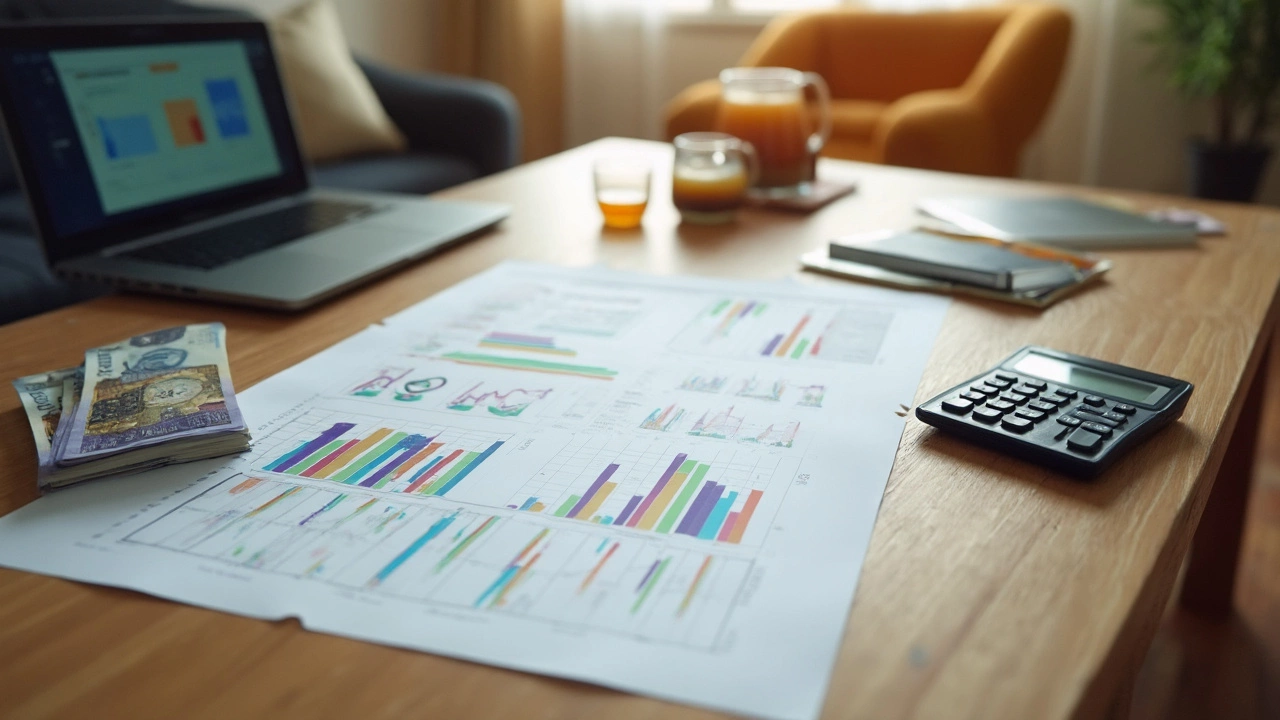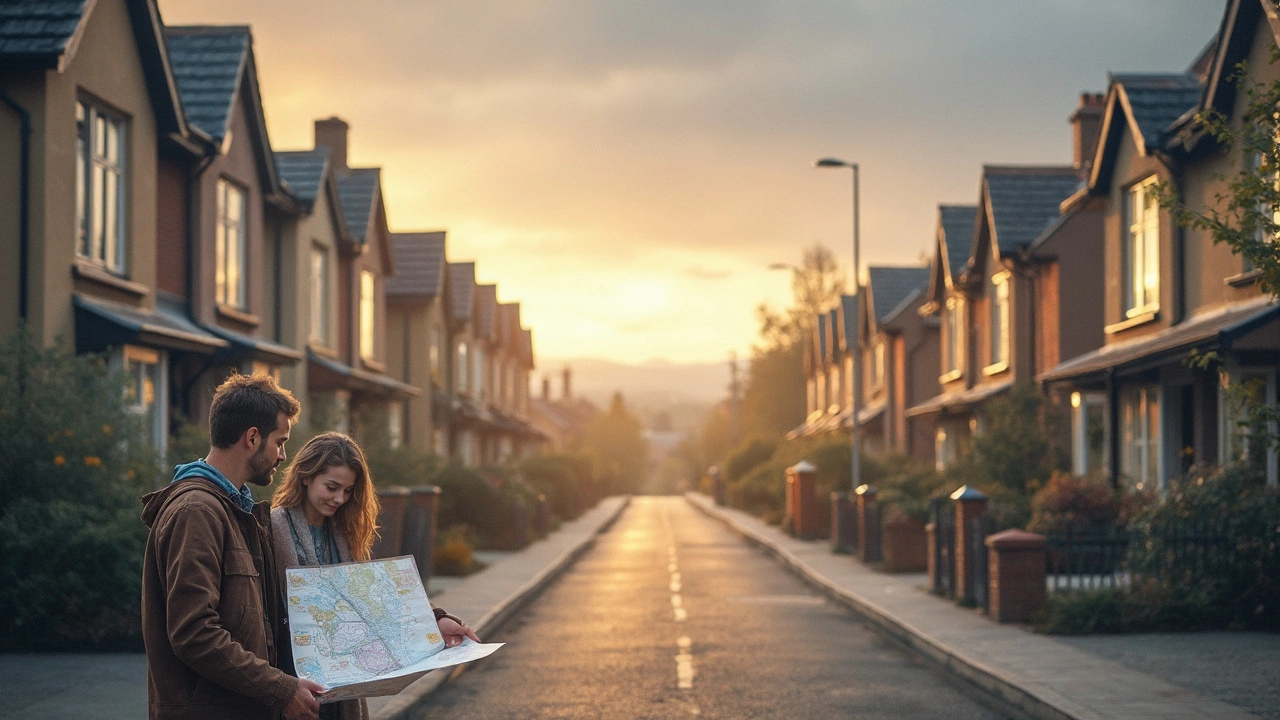So, you're eyeing that beautiful $700,000 house, and you're wondering if your $100,000 salary can actually nab you the keys. It's not a straightforward answer, but let's break it down. First things first: most lenders go with the 28/36 rule, meaning your mortgage shouldn't be more than 28% of your monthly income, and total debts shouldn't exceed 36%. This translates to about $2,333 a month for your house payment alone, not a penny more if you stick to that formula.
Of course, that figure doesn't include property taxes, insurance, or homeowners association fees, which can hike up your monthly bill. And then there are the interest rates, which can dramatically affect affordability. Are we talking about a 5% rate or something closer to 7%? Those numbers can stretch your budget fast.
But hey, it's not all gloom and doom. Buying a house brings tax benefits and, with some smart financial planning, it's achievable. The key lies in understanding the full picture, preparing for any surprises, and maybe compromising on non-essential dream features. Next up, let's explore how these additional costs can impact your budget.
- Understanding Your Budget
- Breaking Down the Costs
- Potential Financial Pitfalls
- Tips for First-Time Buyers
- Final Thoughts
Understanding Your Budget
Alright, so let's talk about what your budget really looks like when you're trying to buy a $700,000 house on a $100,000 salary. It's not just about the mortgage payment, as you've got several financial balls to juggle.
Your Monthly Mortgage
The first thing on your mind is probably the mortgage. With a decent credit score, you might snag an interest rate somewhere around 5-6%. Let's say you manage a 5.5% interest rate with a 30-year fixed loan. Your monthly payment for principal and interest alone could be roughly $3,978. That's already over the 28% mark of $2,333 we talked about earlier. Adjustments might be necessary.
More Than Just the Mortgage
There's more to it. Alongside that mortgage, you'll face property taxes. In some areas, that might be around 1.2% of the home's value, adding about $700 monthly. Then, you'll have homeowners insurance, often around $100 a month. Toss in the possibility of PMI (Private Mortgage Insurance) if your down payment is less than 20%, and you're looking at another $200 monthly.
Getting a Grip on Other Expenses
Budget for utilities, maintenance, and maybe homeowner's association (HOA) fees if you're in a community with shared amenities. These could easily add another $300-$600 monthly. And hey, nothing's constant. Rates fluctuate, property values change, and life happens.
For a clearer picture, consider drafting a budget that includes:
- Principal and interest payments
- Property taxes and insurance
- Utilities and HOA fees
- Savings for repairs or emergencies
Sticking to this plan can help you figure out what's doable. With housing, it's always better to play it safe than sorry.
Got all that? Stay tuned as we dig deeper into breaking down those costs in the next section.
Breaking Down the Costs
Alright, let's get into the nitty-gritty of buying that $700k house. Because owning a home isn't just about meeting your mortgage payments. There's a slew of other expenses you absolutely can't ignore. First up: property taxes. These can vary widely, but on average, you might fork over around 1.1% of your home's value annually. So you're looking at roughly $7,700 a year, or about $642 a month. Ouch, right?
Then there's homeowners insurance. This is like an umbrella for your house, protecting you from disasters and mayhem. The average cost here is about $1,500 a year, or $125 a month.
Next are those pesky HOA fees if your dream home happens to be in a community with shared amenities. These can range from just $50 to several hundred bucks a month. Don’t forget private mortgage insurance (PMI), which you’ll need if your down payment is less than 20%. PMI typically adds 0.5% to 1% of the loan amount to your yearly bill.
Interest Rates Matter
Interest rates play a massive role in your monthly mortgage. Even a small increase can cost you big over time. At a 5% interest rate, on a 30-year fixed loan, your monthly payment for the principal and interest might be around $3,758. Now, if that rate jumps to 7%, you're paying over $1,000 more each month!
The Full Picture
Let's add it all up, shall we? Assuming a 5% interest rate, 1.1% in property taxes, and average homeowners insurance, you're easily looking at over $4,500 in monthly housing costs—and that doesn't even touch on utilities and maintenance!
| Expense | Monthly Cost |
|---|---|
| Principal & Interest | $3,758 |
| Property Taxes | $642 |
| Homeowners Insurance | $125 |
| Total | $4,525 |
Bottom line? It pays (literally) to do the math before jumping into homeownership. Make sure you understand every penny you'll be expected to shell out before you sign on that dotted line.

Potential Financial Pitfalls
When you're thinking about buying that $700,000 house on a $100k salary, there are financial traps you need to duck and dodge. It's easy to get excited and overlook some costs that aren't immediately obvious, but trust me, they can bite you later if you're not careful.
Hidden Costs
First up, are the notorious hidden costs. Beyond your mortgage, be prepared for things like higher property taxes in certain areas. And don't forget about home insurance; bigger homes in certain spots might mean pricier coverage.
- Property taxes: Depending on the location, these can vary widely and impact your monthly spend big-time.
- Home maintenance: Older homes or fixer-uppers might mean shelling out for a new roof or HVAC system earlier than you think.
- HOA fees: If your new dream home is in a community with amenities, monthly dues could also weigh on your budget.
Interest Rate Surprises
The interest rate on your mortgage plays a huge role in what you’ll actually pay each month. A seemingly small change from, say, 6% to 7% can mean hundreds more on your monthly bill. Always consider getting pre-approved to know exactly what rate you’re facing.
Market Risks
Real estate markets can be unpredictable. Speaking of 2008 nightmares, home values aren't only destined to rise. It might sound pessimistic, but it's a reminder to avoid stretching your budget to the breaking point.
Potential Recession Impacts
Economic downturns can affect your job security. Having a solid emergency fund, ideally six months' worth of expenses, can cushion any job-related shocks. It's about staying prepared without living in fear.
Here's a quick look at average monthly costs based on different interest rates:
| Interest Rate | Monthly Payment |
|---|---|
| 5% | $3,758 |
| 6% | $4,197 |
| 7% | $4,658 |
As you can see, it goes up pretty rapidly. The take-home? Plan smartly, know your numbers and go in with eyes wide open. You'll navigate those financial pitfalls better with a clear picture of what you're really up against in your quest for that $700k home.
Tips for First-Time Buyers
Buying your first home can be a mix of excitement and overwhelm, especially when it's a 700k house on a $100k salary. But fear not, I've got some tips to help you navigate this journey.
1. Know Your Credit Score
Your credit score is key in securing a good mortgage rate. Scores above 700 generally get better rates. Check yours and take steps to improve it if needed.
2. Save for a Down Payment
Conventional wisdom suggests a 20% down payment, which can be a stretch. Consider aiming for at least 10% while planning for additional costs like closing fees and moving expenses.
3. Get Pre-Approved
Before house hunting, get a mortgage pre-approval letter. It sets your budget and shows sellers you’re a serious buyer.
4. Budget for Hidden Costs
Remember, your monthly payment includes more than just the mortgage. Factor in property taxes, insurance, and potential HOA fees. Here's a quick table to show how these could look:
| Expense | Monthly Cost |
|---|---|
| Mortgage | $2,333 |
| Property Tax | $350 |
| Insurance | $150 |
| HOA | $100 |
5. Hire a Realtor
An experienced realtor can guide you through negotiations and paperwork. Choose someone familiar with the area's market trends.
6. Stay Flexible
Be open to compromises. Maybe that dream backyard isn't essential. Keep your must-have list short and practical.
Purchasing a home is a major decision but with the right prep and mindset, it's entirely possible. Keep these tips handy and move forward with confidence!

Final Thoughts
Taking the plunge into homeownership, especially for that $700k house, is a big decision on a $100k salary. It's about weighing dreams against real-world numbers and ensuring your investment is sound.
Think Long-Term
Remember, buying a home isn't just a short-term commitment. Are you planning on staying put for several years? Real estate can be a great investment if you give it time to grow, but you don't want to buy it then sell it too quickly. Transaction costs can eat into any short-term gains.
Flexibility is Key
Look at your options carefully. Maybe you settle for a $650k property instead to keep a financial buffer. Flexibility today can prevent stress tomorrow. Don't shy away from negotiating on price, or consider homes that need a little TLC. With work, they could become your dream home.
Check the Extras
Remember the unexpected extras like maintenance costs, repairs, and utilities, which can hit your wallet. Having an emergency fund is not just smart—it's necessary. Some financial experts recommend three to six months of living expenses set aside, just in case.
DIY Numbers
Use online calculators to break down costs, or meet with a financial advisor for personalized advice. Don't just think about the mortgage payments. Look at the full picture, so there are no surprises after signing those papers.
In a nutshell, tackling that dream of buying a first-time home on your salary means understanding all factors involved. Be savvy, do the homework, and you'll find that your home sweet home might be more within reach than it seems.


Corbin Fairweather
I am an expert in real estate focusing on property sales and rentals. I enjoy writing about the latest trends in the real estate market and sharing insights on how to make successful property investments. My passion lies in helping clients find their dream homes and navigating the complexities of real estate transactions. In my free time, I enjoy hiking and capturing the beauty of landscapes through photography.
view all postsWrite a comment